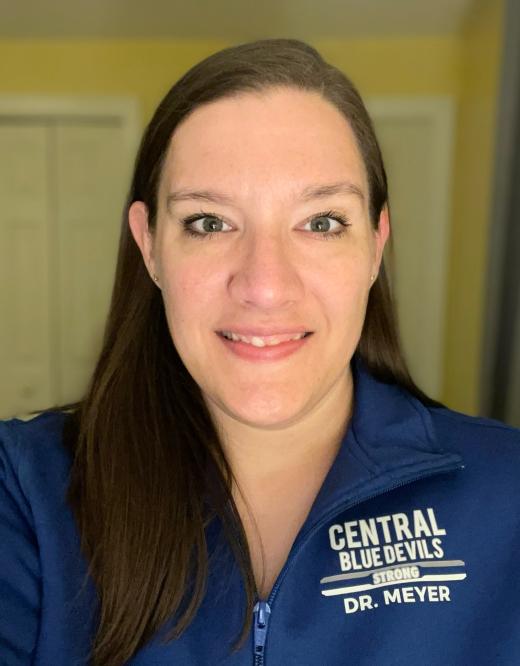
Dr. Kimberly S. Meyer is an Associate Professor at Central Connecticut State University. She earned her Ph.D. in Criminology, Law and Society from George Mason University, MPA (Master of Public Administration) from American University, and B.A. in Social Studies Education from Cardinal Stritch University. This background provides a unique perspective into policy and training issues surrounding and affecting our justice system.
Since coming to Central, Dr. Meyer has taught a variety of courses in the Criminology undergraduate and Criminal Justice master's degree programs, including Current Issues in Criminal Justice Policy, Racism and Bias in Criminal Justice Settings, Introduction to the Criminal Justice System, Field Studies (Internship) in Criminal Justice, and Capstone Seminar. Dr. Meyer also teaches in the First Year program -- including a new course called True Crime in Real Life. She is also currently Vice Chair of the Faculty Senate's Information Technology Committee and a founding member and Co-Chair of the Faculty Writing Circle.
Outside of Central, Dr. Meyer often conducts research alongside juvenile and adult probation agencies, with the goals of understanding client and worker experiences and improving outcomes for clients, practitioners, and agencies. She uses primarily qualitative methods such as interviews, ethnographic observations, and document review to understand policy and practice implementation. She currently has research underway examining how marijuana legalization has affected community corrections agencies and assessing risk of immediate reoffending by young adults with a history of serious, violent offenses.
Probation, qualitative research methods, evidence-based practice, juvenile justice
Selected Peer-Reviewed Publications
Kras, K. R., Meyer, K. S., Dmello, J. R., & Rudes, D. S. (2024). Individual and organizational correlates of morale among workers in a youth and family court agency. Crime & Delinquency, 70(2), 491-518. https://doi.org/10.1177%2F00111287221115646
Taxman, F. S., Tafrate, R. C., Cox, S. M., & Meyer, K. S. (2022). Violence and gun violence among justice-involved persons: Practice guidelines for probation staff. Federal Probation: A Journal of Correctional Philosophy and Practice, 86(1), 27-37. https://www.uscourts.gov/federal-probation-journal/2022/06/violence-and-gun-violence-among-justice-involved-persons-practice
Bantley, K. A., Koski, S. V., Greenebaum, J., Merenstein, B., & Meyer, K. S. (2021). A ‘Ruth-less’ court in the 21st century: How the loss of RBG may hurl progress toward women’s equality back to the Dark Ages. Women’s Rights Law Reporter, 42, 157-171.
Kras, K. R., Dmello, J. R., Meyer, K. S., Butterfield, A. E., & Rudes, D. S. (2019). Attitudes toward punishment, organizational commitment, and cynicism: A multilevel analysis of staff responses in a juvenile justice agency. Criminal Justice and Behavior, 46(3), 475-491.
Book Chapters
Kras, K. R., Magnuson, S., & Meyer, K. S. (2019). Evaluating practice: Observation methods. In P. Raynor, F. McNeill, F. S. Taxman, C. Trotter, P. Ugwudike, & H. Graham (Eds.). The Routledge Companion to Rehabilitative Work in Criminal Justice. New York: Routledge.
Rudes, D. S., Meyer, K. S., & Magnuson, S. (2019). The lost narrative in carceral settings: Evaluative practices and methods to improve process and outcomes in institutions. In P. Raynor, F. McNeill, F. S. Taxman, C. Trotter, P. Ugwudike, & H. Graham (Eds.). The Routledge Companion to Rehabilitative Work in Criminal Justice. New York: Routledge.
Rudes, D. S., Kras, K. R., Meyer, K. S., & Magnuson, S. (2018). Implementation uptake: Organisational factors affecting evidence-based reform in community corrections in the United States. In P. Ugwudike, P. Raynor, & J. Annison (Eds.) Evidence-Based Skills in Criminal Justice: International Research on Supporting Rehabilitation and Desistance (pp. 79-95). London: Policy Press.
Rudes, D. S., Viglione, J., & Meyer, K. S. (2017). Risky needs: Risk-entangled needs in probation supervision. In F. S. Taxman (Ed.) Handbook on Risk and Need Assessment: Theory and Practice (pp. 406-428). New York: Routledge.
Selected Translational Work & Technical Reports
Bernard, K., Meyer, K., Arce, A., & Bower, L. (2022). Probation and parole professionals identify where they most need support. Perspectives, 45(4), 48-52. American Probation and Parole Association.
Meyer, K. S., Kras, K. R., & Rudes, D. S. (2018). Troubles and violations: Probation officer responses to juvenile offender behavior. Perspectives, 42(4), 28-37. American Probation and Parole Association.
Excellence in Teaching Honor Roll, 2024
Excellence in Teaching Honor Roll, 2022
Academy of Criminal Justice Sciences
- Immediate Past Chair, Juvenile Justice and Delinquency Section (2024-2026)
American Probation and Parole Association
American Society of Criminology
CCSU 102 - True Crime in Real Life (FYE)
CJ 501 - Nature of Crime
CJ 594 - Capstone Seminar
CRM 110 - Introduction to Criminal Justice (FYE)
CRM 260 - Criminology
CRM 303 - Juvenile Offending
CRM 320 - Current Issues in Criminal Justice Policy
CRM 326 - Racism & Bias in Criminal Justice Settings
CRM 378 - Career Exploration & Planning in Criminal Justice
CRM 435 - Field Studies (Internship) in Criminal Justice
CRM 478 - Special Topics: Qualitative Methods
HON 250 - Western/World Culture III: Comparative Topics




